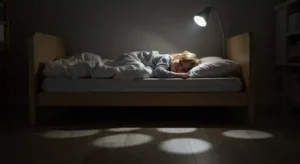Wondering if that afternoon coffee keeps you awake? Discover new research findings on how late caffeine consumption disrupts sleep quality, even hours before bed, and learn simple prevention tips. Get the facts in this sleep science update.
Understanding Caffeine’s Evening Effect
This study, conducted at Henry Ford Hospital and Wayne State University, involved twelve healthy individuals. Their goal was simple: figure out how a standard dose of caffeine (equivalent to about two and a half cups of coffee) affects nighttime sleep when consumed at different times. They specifically looked at caffeine taken right before bed, three hours before bed, and six hours before bed.
Unpacking what the research reveals:
The most significant sleep disruptions occurred when caffeine was consumed six hours before the desired sleep time.
Even six hours prior, caffeine pulled back more than an hour from total sleep duration on objective measures.
There’s an important distinction here: objective sleep measures (like lab monitoring) show clear issues, even if the person themselves doesn’t feel like they had a poor night’s sleep.
The lead author, Christopher Drake, Ph.D., put it clearly: “Drinking a big cup of coffee on the way home from work can lead to negative effects on sleep just as if someone were to consume caffeine closer to bedtime.” Caffeine consumed nearer to bedtime, earlier in the afternoon, and even quite late still interfere with your body’s natural wind-down process. He also highlighted that people tend to underestimate the sleep-disruptive power of afternoon caffeine.
Caffeine Doesn’t Just Knock You Awake at Night
Think caffeine’s only job is to snap you out of drowsiness during the day? Think again. Its most profound impact comes later, when trying to fall asleep and stay asleep. Caffeine is a stimulant that prevents adenosine (the sleep hormone) from binding, delaying your body’s internal clock signals for tiredness. Consuming caffeine allows your system to gradually eliminate its effects (its half-life is about 5-9 hours), but that doesn’t mean it stops influencing your wakefulness and sleepiness cycle well into the evening.
Implications for Better Sleep Hygiene
So, what does this mean practically?
Timing is Crucial: To support your body’s need for uninterrupted sleep, it’s wise to stop drinking caffeinated beverages significantly earlier. Aim to finish all consumption by 5 p.m. at the latest. If your regular intake includes evening drinks like tea, you might want to swap those for decaf or warm milk instead.
Listen to Your Body: Pay attention to your personal tolerance. Someone who metabolizes caffeine slowly might be more sensitive than average. Adjust your cutoff time based on when you typically experience daytime grogginess or late-night jitters.
For Parents: Remember this when offering caffeine-fueled treats or drinks to children. Even moderate doses can genuinely disrupt their developing sleep patterns. Energy drinks and excessive sodas pose a higher risk for child sleep issues and potential health problems.
Checking the time. Pouring a cup of tea or coffee. Taking that energy shot with dinner. Be mindful – consuming caffeine too close to bedtime can genuinely throw a wrench into your sleep quality, even if you don’t perceive the problem at first glance.
(Source: Drake CJ, Patel N, Rivera R, Porofsky D, Carskadon MA. The effects of caffeine consumed before sleep onset or in the evening on total sleep time for healthy adults. J Clin Sleep Med. 2011 Oct 15;7(5):584-8.)
A Key Research Finding
One of the most important takeaways from this study is its distinction between subjective and objective measures of sleep. While participants often reported feeling fine about their sleep after consuming caffeine six hours before bed, research using tools like polysomnography (PSG) detected a significant drop in their actual sleep time of over an hour. This highlights the limitation of relying solely on self-perception for sleep quality.
Conclusion
The Journal of Clinical Sleep Medicine study confirms what many experienced but perhaps didn’t fully understand: caffeine timing matters significantly for nighttime sleep. Caffeine consumed as late as six hours before bed can objectively reduce sleep duration a lot. Because its half-life means it can take several hours to clear, sticking to caffeine-free routines closer to sleep time is recommended for better rest.
Frequently Asked Questions
Does afternoon coffee affect sleep?
Yes. Caffeine consumption as late as six hours before intended sleep can significantly reduce sleep time, as demonstrated by research.
Can caffeine consumed early in the afternoon prevent you from falling asleep at night?
Usually not enough to prevent sleep onset entirely, but even significant caffeine intake early afternoon can still delay sleep timing and reduce sleep quality by interfering with the natural sleep drive, especially if consumed close to your typical sleep time or bedroom caffeine habits changed.
Sources
- caffeine timing and sleep quality study: https://www.healthline.com/health/sleep-disruptions/caffeine-effect
- expert advice on caffeine and sleep from Mayo Clinic: https://www.mayoclinic.org/healthy-lifestyle/adult-health/multimedia/caffeine-and-sleep/mc-00001
- NIH information on caffeine’s effects on sleep: https://www.nih.gov/news-events/health-information/health-topics/interactive-tools/caffeine-drug-fact-sheets








